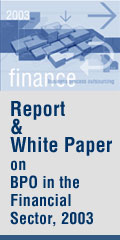|
|
IMF sees heightened risks to global financial stability & urges comprehensive action
October 7, 2008: The International Monetary Fund (IMF) today said the state of the global financial system has worsened since its last assessment in April 2008. The ongoing deleveraging process has accelerated and threatens to become disorderly increasing the risk a severe adverse feedback loop between the financial system and the broader economy.
Monetary and financial conditions have tightened further, risk appetites have continued to retrench, and global macroeconomic, credit, market, liquidity, and emerging market risks have increased, according to the October 2008 edition of the IMF's Global Financial Stability Report (GFSR). The IMF also underscored the determination of governments to respond to the challenges, but said that the restoration of financial stability would benefit from a collective commitment by authorities to address the challenges effectively.
"Today's GFSR report shows how serious a crisis we currently face," IMF Managing Director Dominique Strauss-Kahn stated. "The time for piecemeal solutions is over. I therefore call on policymakers to urgently address the crisis at a national level with comprehensive measures to restore confidence in the financial sector. At the same time, national governments must closely coordinate these efforts to bring about a return to stability in the international financial system."
Mr. Jaime Caruana, Counsellor and Director of the IMF's Monetary and Capital Markets Department, which authored the report, noted, "The global financial system has undergone unprecedented turmoil in the last few months, and the situation has worsened considerably since Spring. But, as severe as circumstances are, the resolve and sense of urgency of country authorities to tackle the issues at hand and the sense of urgency to intensify international cooperation are encouraging developments."
"Concrete actions, however, are needed to tackle insufficient capital, falling asset valuations, and a dysfunctional funding market. Such a comprehensive approach, if consistent among countries, should be sufficient to restore confidence and the proper functioning of markets, and avert a more protracted downturn in the global economy," he added.
The U.S. remains the epicenter of the financial crisis, with its housing market continuing to decline and a wider economic slowdown contributing to a further deterioration in the quality of existing loans. With the turning point in the default cycle yet to be reached, the GFSR estimates that declared losses on U.S.-originated loans and securitized assets are likely to amount to about $1.4 trillion, compared to the April 2008 GFSR estimate of $945 billion. Authorities in the U.S. and a number of countries have taken measures to bolster confidence in financial institutions and markets, including injecting capital in financial institutions or proposing to buy troubled assets. "The ultimate success of these measures is difficult to gauge. But as the specifics become clear, the authorities will need to communicate clearly how the risks to taxpayers will be contained," Caruana said.
The GFSR notes borrowers and financial institutions in emerging markets, which until recently remained fairly resilient, will be confronted with a much more challenging economic environment: A combination of global credit tightening, and economic slowdown, which could accelerate a downturn in the domestic credit cycle in some countries. Those economies with greater reliance on short-term flows or with leveraged banking systems funded internationally are particularly vulnerable.
In the short term, and to bolster global financial stability, the GFSR recommends that authorities of affected countries publicly make a collective commitment to address the issue. Based on experience from earlier crises, it recommends five principles that can help authorities restore confidence in these exceptional circumstances: (i) employ measures that are comprehensive, timely, and clearly communicated; (ii) aim for a consistent and coherent set of policies to stabilize the global financial system across countries; (iii) ensure rapid response on the basis of early detection of strains in order to contain systemic repercussions; (iv) assure that emergency government interventions are temporary and taxpayer interests are protected; and (v) avoid losing sight of the objective of a more sound, competitive, and efficient financial system going forward.
(This is press release of IMF)
Global banking industry to see more restructuring & consolidation
MUFG to invest US$9 billion in Morgan Stanley
Citigroup to buy Wachovia Banking Operations
Nomura to acquire Lehman's European and Middle East operations
US Financial Crisis to indirectly impact Asian banks
Limited impact on Asia-Pacific banks from Lehman bankruptcy
Broader Implications of Lehman bankruptcy and Merrill Lynch acquisition
Barclays announces agreement to partly acquire Lehman Brothers
US Financial Crisis prompts RBI to announces market measures
Lehman Brothers Holdings Inc files for bankruptcy: A Special Report
Bank of America buys Merrill Lynch for $50 billion
Subprime Crisis: A Special
CLICK FOR MORE FEATURES & STORIES

|
|


|



